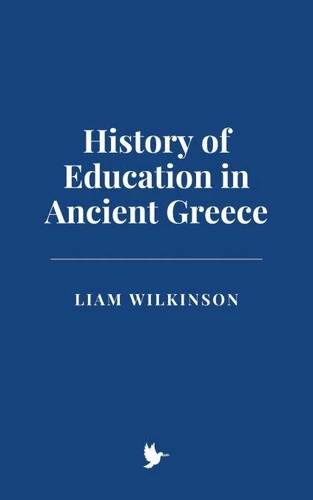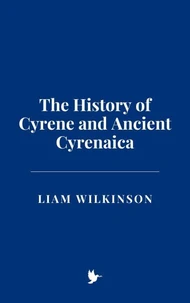History of Education in Ancient Greece
Par :Formats :
Disponible dans votre compte client Decitre ou Furet du Nord dès validation de votre commande. Le format ePub est :
- Compatible avec une lecture sur My Vivlio (smartphone, tablette, ordinateur)
- Compatible avec une lecture sur liseuses Vivlio
- Pour les liseuses autres que Vivlio, vous devez utiliser le logiciel Adobe Digital Edition. Non compatible avec la lecture sur les liseuses Kindle, Remarkable et Sony
 , qui est-ce ?
, qui est-ce ?Notre partenaire de plateforme de lecture numérique où vous retrouverez l'ensemble de vos ebooks gratuitement
Pour en savoir plus sur nos ebooks, consultez notre aide en ligne ici
- FormatePub
- ISBN8230547976
- EAN9798230547976
- Date de parution30/12/2024
- Protection num.pas de protection
- Infos supplémentairesepub
- ÉditeurIndependently Published
Résumé
This work explores the rich and complex history of education in ancient Greece, examining its foundational principles and practices. Spanning the formative eras of Minoan and Mycenaean civilizations through the Classical and Hellenistic periods, Greek education evolved into a multifaceted system that integrated physical training, intellectual development, moral philosophy, and civic responsibility.
Central to Greek pedagogy were the concepts of paideia (holistic education), arete (excellence), and the cultivation of virtue, which aimed to prepare individuals for meaningful participation in the life of the polis. Key educational institutions such as the agoge in Sparta, the gymnasium, and philosophical academies like those founded by Plato and Aristotle are analyzed in depth, highlighting their roles in shaping Greek culture and thought.
The transformative contributions of figures such as Socrates, Plato, Aristotle, and the Sophists are explored, illustrating their influence on the philosophical and practical dimensions of teaching. Special attention is given to the inclusion and exclusion of marginalized groups, such as women and non-citizens, and the implications of these dynamics for Greek society. The work also examines the dissemination of Greek educational ideals into the Roman world, emphasizing their synthesis with Roman pragmatism and their profound impact on Western intellectual traditions.
Furthermore, the text reflects on the integration of Greek concepts into modern pedagogy, particularly the emphasis on critical thinking, ethical reflection, and interdisciplinary learning. Drawing on a wealth of primary sources-philosophical treatises, epic poetry, historical accounts, and archaeological evidence-alongside modern scholarship, this study provides a comprehensive analysis of Greek education as a dynamic and enduring force.
The legacy of Greek education continues to resonate, offering timeless insights into the transformative power of knowledge, the role of education in fostering civic engagement, and the pursuit of human excellence.
Central to Greek pedagogy were the concepts of paideia (holistic education), arete (excellence), and the cultivation of virtue, which aimed to prepare individuals for meaningful participation in the life of the polis. Key educational institutions such as the agoge in Sparta, the gymnasium, and philosophical academies like those founded by Plato and Aristotle are analyzed in depth, highlighting their roles in shaping Greek culture and thought.
The transformative contributions of figures such as Socrates, Plato, Aristotle, and the Sophists are explored, illustrating their influence on the philosophical and practical dimensions of teaching. Special attention is given to the inclusion and exclusion of marginalized groups, such as women and non-citizens, and the implications of these dynamics for Greek society. The work also examines the dissemination of Greek educational ideals into the Roman world, emphasizing their synthesis with Roman pragmatism and their profound impact on Western intellectual traditions.
Furthermore, the text reflects on the integration of Greek concepts into modern pedagogy, particularly the emphasis on critical thinking, ethical reflection, and interdisciplinary learning. Drawing on a wealth of primary sources-philosophical treatises, epic poetry, historical accounts, and archaeological evidence-alongside modern scholarship, this study provides a comprehensive analysis of Greek education as a dynamic and enduring force.
The legacy of Greek education continues to resonate, offering timeless insights into the transformative power of knowledge, the role of education in fostering civic engagement, and the pursuit of human excellence.
This work explores the rich and complex history of education in ancient Greece, examining its foundational principles and practices. Spanning the formative eras of Minoan and Mycenaean civilizations through the Classical and Hellenistic periods, Greek education evolved into a multifaceted system that integrated physical training, intellectual development, moral philosophy, and civic responsibility.
Central to Greek pedagogy were the concepts of paideia (holistic education), arete (excellence), and the cultivation of virtue, which aimed to prepare individuals for meaningful participation in the life of the polis. Key educational institutions such as the agoge in Sparta, the gymnasium, and philosophical academies like those founded by Plato and Aristotle are analyzed in depth, highlighting their roles in shaping Greek culture and thought.
The transformative contributions of figures such as Socrates, Plato, Aristotle, and the Sophists are explored, illustrating their influence on the philosophical and practical dimensions of teaching. Special attention is given to the inclusion and exclusion of marginalized groups, such as women and non-citizens, and the implications of these dynamics for Greek society. The work also examines the dissemination of Greek educational ideals into the Roman world, emphasizing their synthesis with Roman pragmatism and their profound impact on Western intellectual traditions.
Furthermore, the text reflects on the integration of Greek concepts into modern pedagogy, particularly the emphasis on critical thinking, ethical reflection, and interdisciplinary learning. Drawing on a wealth of primary sources-philosophical treatises, epic poetry, historical accounts, and archaeological evidence-alongside modern scholarship, this study provides a comprehensive analysis of Greek education as a dynamic and enduring force.
The legacy of Greek education continues to resonate, offering timeless insights into the transformative power of knowledge, the role of education in fostering civic engagement, and the pursuit of human excellence.
Central to Greek pedagogy were the concepts of paideia (holistic education), arete (excellence), and the cultivation of virtue, which aimed to prepare individuals for meaningful participation in the life of the polis. Key educational institutions such as the agoge in Sparta, the gymnasium, and philosophical academies like those founded by Plato and Aristotle are analyzed in depth, highlighting their roles in shaping Greek culture and thought.
The transformative contributions of figures such as Socrates, Plato, Aristotle, and the Sophists are explored, illustrating their influence on the philosophical and practical dimensions of teaching. Special attention is given to the inclusion and exclusion of marginalized groups, such as women and non-citizens, and the implications of these dynamics for Greek society. The work also examines the dissemination of Greek educational ideals into the Roman world, emphasizing their synthesis with Roman pragmatism and their profound impact on Western intellectual traditions.
Furthermore, the text reflects on the integration of Greek concepts into modern pedagogy, particularly the emphasis on critical thinking, ethical reflection, and interdisciplinary learning. Drawing on a wealth of primary sources-philosophical treatises, epic poetry, historical accounts, and archaeological evidence-alongside modern scholarship, this study provides a comprehensive analysis of Greek education as a dynamic and enduring force.
The legacy of Greek education continues to resonate, offering timeless insights into the transformative power of knowledge, the role of education in fostering civic engagement, and the pursuit of human excellence.























